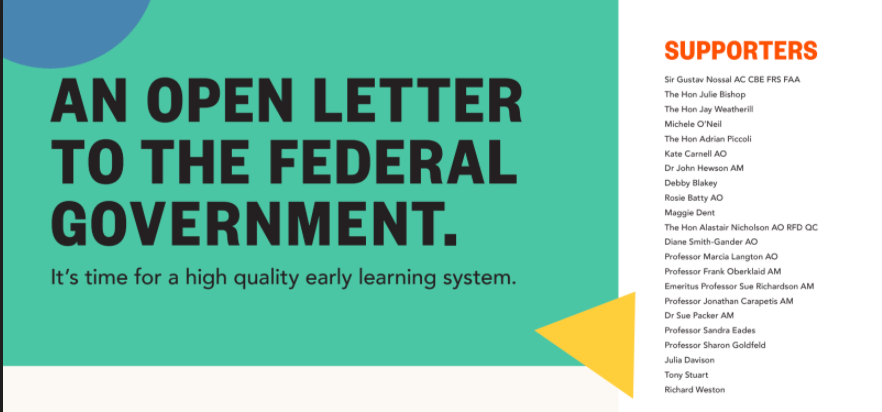To say 2020 has been full of surprises is an understatement. It’s been a year like no other and few, if any, of the surprises presented have been welcome. It makes reporting something even remotely positive thrilling.
And this is more than remotely positive. It’s actually seriously exciting and I don’t say that lightly.
On Tuesday night leaders, parents, workers, educators and community organisations from across Australia are joining forces to call for a universally accessible early education system.
Nicola Forrest, Jay Weatherill, Professor Fiona Stanley, Julie Bishop, Michele O’Neil, Dr John Hewson, Helen Gibbons, Kate Carnell and Adrian Piccoli are among those speaking at the launch of the Thrive By Five campaign, an initiative of the Minderoo Foundation.
The campaign is supported by Goodstart Early Learning, Early Childhood Australia, ARACY, The Mitchell Institute, the ACTU, The United Workers Union, The Australia Institute, The Parenthood, Chief Executive Women, The Centre for Social Impact, The Smith Family, ACOSS and more.
As Executive Director of The Parenthood I am thrilled to be involved in this campaign and when I say thrilled I’m not just being polite or disingenuous. This is an opportunity to overhaul Australia’s system for early education and care and overdue barely covers it. Potentially I don’t get out enough but being part of a campaign that may help deliver this vital reform actually makes my heart race.
The benefits children derive from accessing high quality early education are profound and indisputable. It is the most efficacious investment a government can make in the health and prosperity of its future.
At the moment one in five Australian children arrive at school developmentally vulnerable, and it’s two in five for Aboriginal and Torres Strait Islander children. Attending early childhood education is an effective way to overcome this.
For every $1 the government spends on pre-primary education in the year before school, $2 in benefits flow.
Aside from the multitude of benefits to children, overhauling early education and care will deliver for the economy – and for women in particular.
Like so many others I didn’t realise how broken our early education and care system was until my husband and I had to navigate it for the first time almost a decade ago. I’ve told, retold, written and re-written the story of securing appropriate care for our firstborn when I returned to work at least a million times.
The only care we could get for our delightful daughter was a wonderful centre in the middle of Sydney’s CBD which would have been far more palatable if either myself or my husband worked in the city. It cost $156 a day which meant the weekly bill was more than we paid in rent, and the rebate, which was expressed as 50% but only up to $7,500 a year, ran out after three months. The fact we had to take a toddler on a bus twice a day in peak hour traffic and then make our way back out of the city to work was laughably absurd.
We persevered but within days the numbers I’d previously found perplexing as a reporter at BRW magazine made perfect sense. This was why so many Australian women didn’t keep working after children. This was why the pay gap persisted and the representation of women in senior ranks remained stubbornly rare. The system was stacked against mums.
By global standards the cost of childcare in Australia is prohibitively expensive. Combined with our tax system it actively disincentivises women from working beyond three days a week.
Knowing that other countries approach early education differently – as critical infrastructure for children’s development and education as well as for families to participate in paid work – has always given me hope that, one day, perhaps Australia might do things differently.
This campaign, at this point in Australia’s history, while we are navigating our way out from a global pandemic and a historic economic contraction, feels like the closest we’ve ever been. The case could not be more clear and the support is growing every day.


